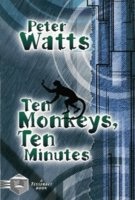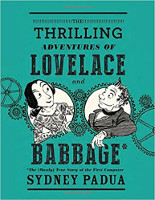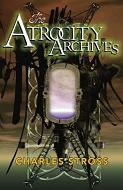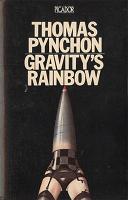 You know the theorem that an infinite number of monkeys, randomly hitting keys on typewriters, would eventually over an infinite period produce, for example, the collected works of William Shakespeare, yes?
You know the theorem that an infinite number of monkeys, randomly hitting keys on typewriters, would eventually over an infinite period produce, for example, the collected works of William Shakespeare, yes?
Well, here is the book with the most self-deprecating title, ever - who would, in their right mind and the light of the above, call their book Ten Monkeys, Ten Minutes? It’s a rhetorical question, I know.
Ten Monkeys, Ten Minutes is the first short story collection by Peter Watts, published on the heel of the critically acclaimed novel Starfish, and prior to the (differently marvelous) Maelstrom. Overall Peter now has 5-7 novels (it depends a bit on how you count) and two collections to his name, most of which he also makes available via his website for free. And if that makes you think he might have strong opinions about publishers, and about IP, then you would very much be right…
A number of the stories in this collection have since been re-released as part of the more recent ‘Beyond the Rift’ collection. I have not checked if these are 100% identical, or if some minor editing or re/writing has taken place. It’s not relevant, I feel - all of them bear re-reading, and completists will want both books anyway.
Below I provide a short overview of the stories in this slim volume, and a capsule review of what they are about and what I thought of them; if you’d rather avoid such spoilers then I’d like to leave you with the recommendation that this is a rather splendid and clever collection, and well worth your time.
A Niche: This is an award-winning prequel to Starfish; it took 9 years between the initial publication of this story, and the publication of the novel. Still - this encounter with Lenie Clarke still makes the hairs on my neck stand on end… claustrophobic, gritty, and compulsive.
Fractals: A story about the self, and the other. About racism, tribalism, and ethnic identity. Primate behaviour, really, us against them, with the definition of what is us and what is them continually shifting, fractally or rather self-similar and scale-invariant. Uncomfortable, as he has no answers, either.
The second coming of Jasmine Fitzgerald: Quantum Physics, and Religion. Still entertaining, even after he went to town on the topic with Echopraxia this year.
Bulk Food: Here the marine biologist comes through with a vengeance. We have intelligent Orcas, which we communicate with, and make business agreements with. It’s also a massive piss-take on new age, natural harmony, and the peaceful whale myth. Enormously cynical. Hugely entertaining.
Nimbus: Clouds are intelligent. Or, rather, comprised of distributed intelligent cells. Their thought processes are slow, but they have finally cottoned on to what’s been going on with the atmosphere. And boy are they pissed at us, for some reason. Forget Heavy Weather - this is targeted, personal (well, specicist I guess), and with the aim of getting rid of the irritant. And humanity has to adapt, has to develop an immune response to this.
Worryingly believable, despite the underlying premise.
Flesh Made Word: A scientist researching death processes loses his humanity in the process. Not the strongest story in the book, IMHO.
Ambassador: The only story in the book not published previously; written specifically for this collection (and then re-published in Beyond the Rift). Explodes the fallacy that intelligence above a certain level must be peaceful and wise, by projecting Darwinism and survival instinct straight out into Space Opera territory. Marvelous.
Bethlehem: A story about entropy, about the laws of thermodynamics, and the drive of the universe towards chaos. And about a scientist hiding in his observation of the quantum layer (“the real world”, he calls it) to avoid collapsing the probability waves around him.
“this torrent screaming through time and space, tearing everything apart. and sometimes these little pockets of information in the eddies, in these tiny protected backwaters, and sometimes they get complicated enough to wake up and brag about beating the odds. Never lasts, though. Takes too much energy to fight the current”
Unsettling and comforting at the same time, somehow.
Home: another Rifters story, this one concerning one the Beebe residents who had disappeared into the abyss, had gone ‘native’, and who had never come back. Until now.
More Peter Watts
Title: Ten Monkeys, Ten Minutes
Author: Peter Watts
Reviewer: Markus
Reviewer URL: http://thierstein.net
Publisher: Tesseract
Publisher URL: http://www.edgewebsite.com
Publication Date: 2000
Review Date: 141218
ISBN:9781895836743
Price: USD 9.95
Pages: 167
Format: Paperback
Topic: Hard SF
Topic: Rifters













